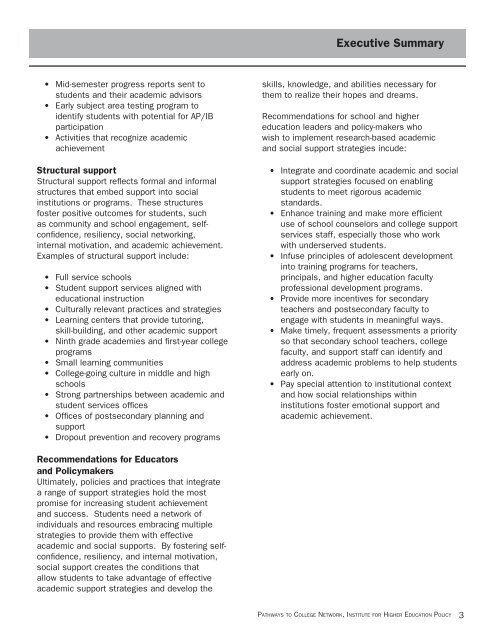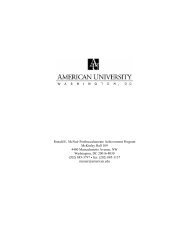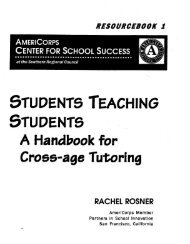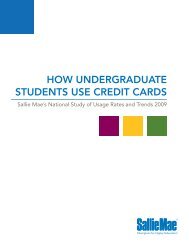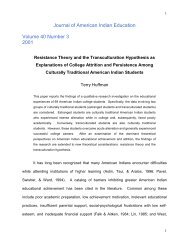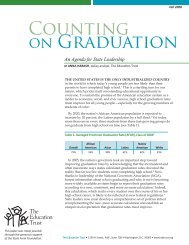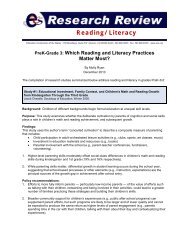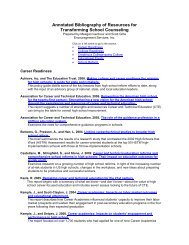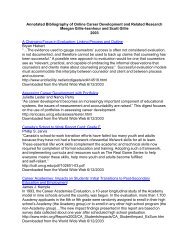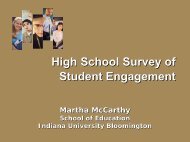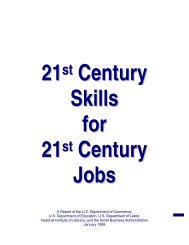Removing Roadblocks to Rigor: Linking Academic and Social ...
Removing Roadblocks to Rigor: Linking Academic and Social ...
Removing Roadblocks to Rigor: Linking Academic and Social ...
Create successful ePaper yourself
Turn your PDF publications into a flip-book with our unique Google optimized e-Paper software.
Executive Summary<br />
• Mid-semester progress reports sent <strong>to</strong><br />
students <strong>and</strong> their academic advisors<br />
• Early subject area testing program <strong>to</strong><br />
identify students with potential for AP/IB<br />
participation<br />
• Activities that recognize academic<br />
achievement<br />
Structural support<br />
Structural support reflects formal <strong>and</strong> informal<br />
structures that embed support in<strong>to</strong> social<br />
institutions or programs. These structures<br />
foster positive outcomes for students, such<br />
as community <strong>and</strong> school engagement, selfconfidence,<br />
resiliency, social networking,<br />
internal motivation, <strong>and</strong> academic achievement.<br />
Examples of structural support include:<br />
• Full service schools<br />
• Student support services aligned with<br />
educational instruction<br />
• Culturally relevant practices <strong>and</strong> strategies<br />
• Learning centers that provide tu<strong>to</strong>ring,<br />
skill-building, <strong>and</strong> other academic support<br />
• Ninth grade academies <strong>and</strong> first-year college<br />
programs<br />
• Small learning communities<br />
• College-going culture in middle <strong>and</strong> high<br />
schools<br />
• Strong partnerships between academic <strong>and</strong><br />
student services offices<br />
• Offices of postsecondary planning <strong>and</strong><br />
support<br />
• Dropout prevention <strong>and</strong> recovery programs<br />
skills, knowledge, <strong>and</strong> abilities necessary for<br />
them <strong>to</strong> realize their hopes <strong>and</strong> dreams.<br />
Recommendations for school <strong>and</strong> higher<br />
education leaders <strong>and</strong> policy-makers who<br />
wish <strong>to</strong> implement research-based academic<br />
<strong>and</strong> social support strategies incude:<br />
• Integrate <strong>and</strong> coordinate academic <strong>and</strong> social<br />
support strategies focused on enabling<br />
students <strong>to</strong> meet rigorous academic<br />
st<strong>and</strong>ards.<br />
• Enhance training <strong>and</strong> make more efficient<br />
use of school counselors <strong>and</strong> college support<br />
services staff, especially those who work<br />
with underserved students.<br />
• Infuse principles of adolescent development<br />
in<strong>to</strong> training programs for teachers,<br />
principals, <strong>and</strong> higher education faculty<br />
professional development programs.<br />
• Provide more incentives for secondary<br />
teachers <strong>and</strong> postsecondary faculty <strong>to</strong><br />
engage with students in meaningful ways.<br />
• Make timely, frequent assessments a priority<br />
so that secondary school teachers, college<br />
faculty, <strong>and</strong> support staff can identify <strong>and</strong><br />
address academic problems <strong>to</strong> help students<br />
early on.<br />
• Pay special attention <strong>to</strong> institutional context<br />
<strong>and</strong> how social relationships within<br />
institutions foster emotional support <strong>and</strong><br />
academic achievement.<br />
Recommendations for Educa<strong>to</strong>rs<br />
<strong>and</strong> Policymakers<br />
Ultimately, policies <strong>and</strong> practices that integrate<br />
a range of support strategies hold the most<br />
promise for increasing student achievement<br />
<strong>and</strong> success. Students need a network of<br />
individuals <strong>and</strong> resources embracing multiple<br />
strategies <strong>to</strong> provide them with effective<br />
academic <strong>and</strong> social supports. By fostering selfconfidence,<br />
resiliency, <strong>and</strong> internal motivation,<br />
social support creates the conditions that<br />
allow students <strong>to</strong> take advantage of effective<br />
academic support strategies <strong>and</strong> develop the<br />
PATHWAYS TO COLLEGE NETWORK, INSTITUTE FOR HIGHER EDUCATION POLICY<br />
3


